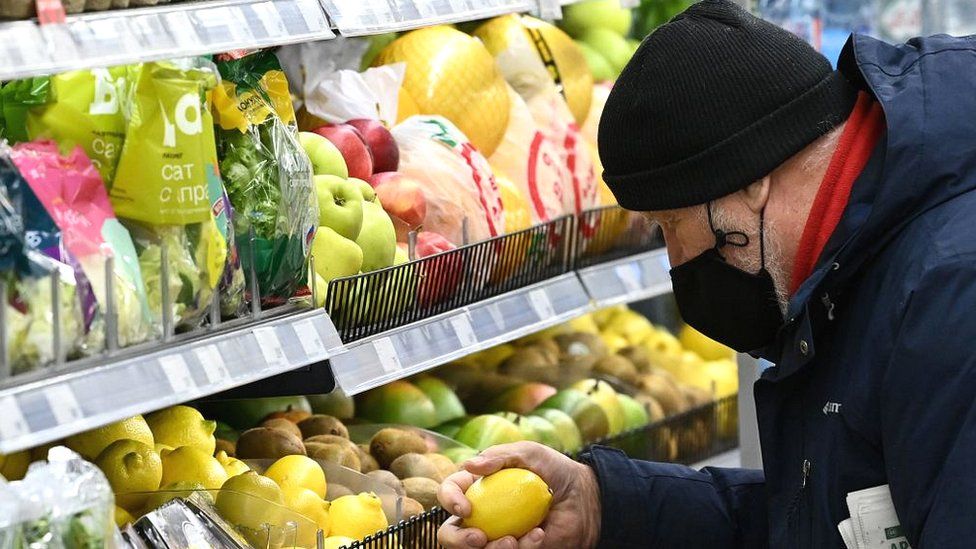256
The cost of living in Russia is surging following the country’s invasion of Ukraine, according to new data.
Official figures show price of some household staples – such as sugar – have jumped by as much as 14% over the past week.
Inflation is set to keep rising in Russia where the rouble has fallen sharply since the Ukraine war began.
The value of the currency has dropped about 22% this year, and this has pushed up the cost of importing goods.
The inflation data came as the Russian stock market resumed trading on Thursday after a month-long hiatus, with the majority of shares rising in a volatile trading session.
The benchmark Moex index was up by around 5.6% at midday in Moscow.
Analysts said a government plan to buy billions of dollars worth of Russian shares was supporting the market, which dived last month after Russia invaded its neighbour.
Bans on trade with foreigners and on short-selling remain in place.
Rising cost of living
On Wednesday, Russia’s economic ministry said annual inflation had jumped 14.5% in the week ending 18 March – the highest rate since late 2015.
The Federal State Statistics Service said the cost of sugar rose by as much as 37.1% in certain regions of the country and increased by an average 14%.
Sugar, which is commonly used to preserve food or make liquor, was the biggest gainer in the week, the government agency found.
The price of onions was the second biggest riser over the week, up 13.7% nationwide and 40.4% in some areas. Meanwhile, nappies were 4.4% more expensive. Prices for black tea rose 4% and toilet paper increased by 3%.
Stephen Innes, managing partner at SPI Asset Management, said prices were higher because of the weaker rouble.
“The biggest culprit is imported inflation,” Mr Innes told the BBC. “Anything Russia imports is exponentially (pricier) due to the weaker rouble.”
Sanctions bite
The UK, the US and the European Union have cut off a number Russian banks from financial markets in the West.
They have also prohibited dealings with Russia’s central bank, state-owned investment funds and the finance ministry.
The Bank of Russia more than doubled its interest rate to 20% in March, in an attempt to stop its currency from sliding further.
A large number of Western businesses have pulled out of Russia because of the war in Ukraine. Others, such as the Swiss food giant Nestle, have withdrawn major brands such as KitKat and Nesquik.
Videos on social media show shoppers scrambling to buy sugar and buckwheat at supermarkets in Moscow.
Deputy prime minister Viktoria Abramchenko has told Russians the country is “fully self-sufficient when it comes to sugar and buckwheat”.
“There is no need to panic buy these goods. There is enough for everybody,” she said.
Russia has hit back at international sanctions, and threatened to seize the assets of businesses that have stopped operating in the country.
It sanctioned US President Joe Biden and 12 other US officials last week.
On Wednesday, Russian President Vladimir Putin announced that the country would start selling natural gas to “unfriendly” countries in roubles. It is understood the move is aimed at supporting the currency.
The EU relies on Russia for 40% of its gas. However, many existing contracts are agreed upon in euros and it is unclear if Russia can change them.
Mr Putin’s announcement drove the rouble to a three-week high. It later closed at 97.7 against the dollar.
BBC


